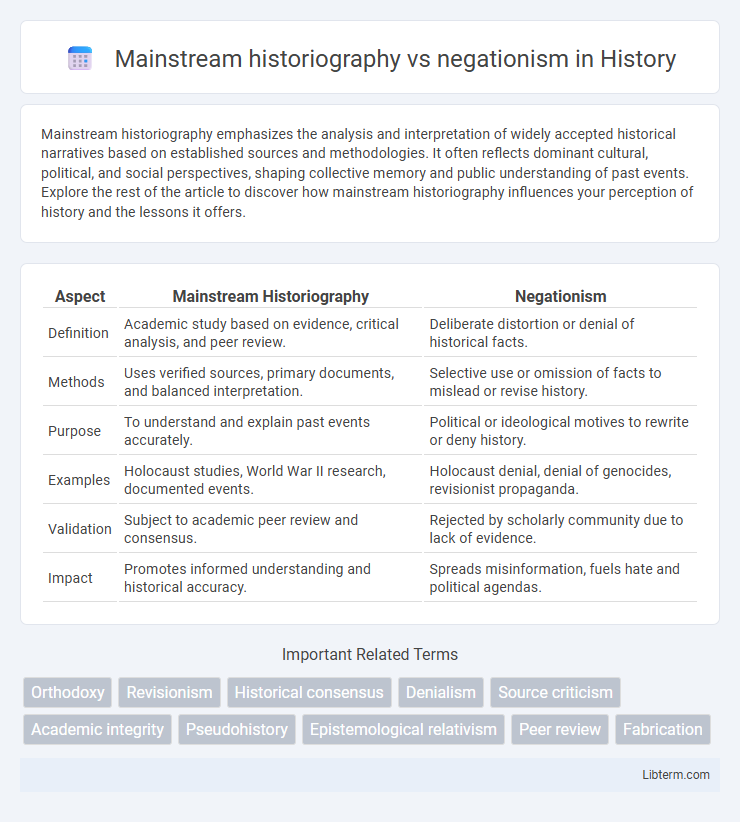Mainstream historiography emphasizes the analysis and interpretation of widely accepted historical narratives based on established sources and methodologies. It often reflects dominant cultural, political, and social perspectives, shaping collective memory and public understanding of past events. Explore the rest of the article to discover how mainstream historiography influences your perception of history and the lessons it offers.
Table of Comparison
| Aspect | Mainstream Historiography | Negationism |
|---|---|---|
| Definition | Academic study based on evidence, critical analysis, and peer review. | Deliberate distortion or denial of historical facts. |
| Methods | Uses verified sources, primary documents, and balanced interpretation. | Selective use or omission of facts to mislead or revise history. |
| Purpose | To understand and explain past events accurately. | Political or ideological motives to rewrite or deny history. |
| Examples | Holocaust studies, World War II research, documented events. | Holocaust denial, denial of genocides, revisionist propaganda. |
| Validation | Subject to academic peer review and consensus. | Rejected by scholarly community due to lack of evidence. |
| Impact | Promotes informed understanding and historical accuracy. | Spreads misinformation, fuels hate and political agendas. |
Introduction to Mainstream Historiography and Negationism
Mainstream historiography relies on critical analysis of primary sources, peer-reviewed research, and consensus within the academic community to construct accurate historical narratives. Negationism, in contrast, deliberately distorts or denies established historical facts, often motivated by ideological agendas or political interests. Understanding these approaches highlights the importance of rigorous methodology in preserving the integrity of historical knowledge.
Defining Historiography: Establishing Scholarly Consensus
Mainstream historiography employs rigorous methodologies and evidentiary standards to establish scholarly consensus on historical events, ensuring accuracy and objectivity in historical interpretation. Negationism deliberately distorts or denies well-documented historical facts, often manipulating data to promote ideological agendas and undermine academic truth. Establishing historiographical consensus relies on peer-reviewed research, corroborated primary sources, and transparent analytical frameworks to differentiate credible scholarship from revisionist denial.
What is Negationism? Historical Denial and Distortion
Negationism refers to the deliberate denial, distortion, or minimization of well-documented historical facts, often related to atrocities such as genocide or war crimes, in order to revise or manipulate public understanding. This practice challenges mainstream historiography, which relies on rigorous evidence, critical analysis, and scholarly consensus to reconstruct accurate historical narratives. Negationism undermines historical truth by promoting falsehoods, erasing victims' experiences, and impeding reconciliation and justice efforts.
Key Differences: Methodology and Evidence
Mainstream historiography relies on rigorous analysis of primary sources, cross-referencing archival documents, and peer-reviewed scholarship to establish a credible narrative of historical events. Negationism deliberately distorts or omits evidence, using selective or falsified data to deny established facts, often motivated by ideological goals. The methodology in mainstream historiography emphasizes transparency, critical scrutiny, and contextualization, whereas negationism lacks academic rigor and commonly engages in revisionism that contradicts well-documented consensus.
Influences of Politics and Ideology on Historical Narratives
Mainstream historiography relies on empirical evidence and peer-reviewed research to construct accurate historical narratives, while negationism distorts or denies facts to serve political or ideological agendas. Political regimes and ideological movements often influence historiographical interpretations by promoting revisions that align with their interests, manipulating collective memory to legitimize authority or marginalize groups. This tension highlights the necessity of critical examination and methodological rigor in history to resist propaganda and preserve scholarly integrity.
Major Cases of Negationism in Modern History
Mainstream historiography relies on critical analysis of primary sources and corroborated evidence to construct an accurate representation of historical events, firmly opposing negationism, which deliberately distorts or denies historical facts, particularly regarding atrocities. Major cases of negationism include Holocaust denial, where perpetrators refuse acknowledgment of the systematic genocide of six million Jews during World War II, and Japanese wartime aggression denial, which minimizes or ignores the Nanking Massacre and other war crimes. These instances challenge the integrity of historical scholarship and demand rigorous factual verification to uphold truth and prevent the erosion of collective memory.
Consequences of Historical Negationism for Society
Historical negationism distorts collective memory by denying or minimizing documented events such as genocides and atrocities, leading to widespread misinformation and societal polarization. This distortion undermines trust in academic research and public institutions, eroding the foundation of truth essential for social cohesion and democracy. Consequently, negationism contributes to the perpetuation of discrimination, hate crimes, and political extremism by enabling revisionist narratives that legitimize harmful ideologies.
The Role of Education in Combating Denialism
Mainstream historiography relies on rigorous analysis of primary sources and consensus among historians to present accurate accounts, while negationism deliberately distorts or denies historical facts, often for ideological purposes. Education plays a critical role in combating denialism by promoting critical thinking, media literacy, and awareness of historical methodology, equipping students to identify and challenge false narratives. Incorporating comprehensive history curricula and fostering open discussions about historical controversies strengthens societal resilience against the spread of denialist ideologies.
Media’s Impact on Shaping Historical Understanding
Mainstream historiography relies on rigorous evidence and peer-reviewed research, shaping public understanding through accurate narratives in textbooks and documentaries. Negationism distorts history by promoting denial or revisionism, often spreading misinformation via sensationalist media and unverified sources. Media plays a crucial role in amplifying either credible scholarly perspectives or deceptive narratives, significantly influencing collective memory and historical consciousness.
Preserving Historical Integrity: Challenges and Solutions
Preserving historical integrity involves rigorously distinguishing between mainstream historiography, which relies on critical analysis of evidence and peer-reviewed research, and negationism, which denies or distorts established historical facts for ideological purposes. Challenges include combating misleading revisionism that undermines collective memory and promoting educational frameworks that emphasize evidence-based scholarship. Effective solutions encompass strengthening archival accessibility, encouraging interdisciplinary methodologies, and fostering public awareness to safeguard truthful historical narratives.
Mainstream historiography Infographic

 libterm.com
libterm.com